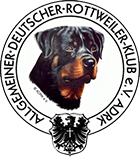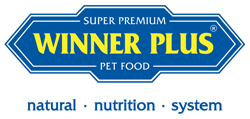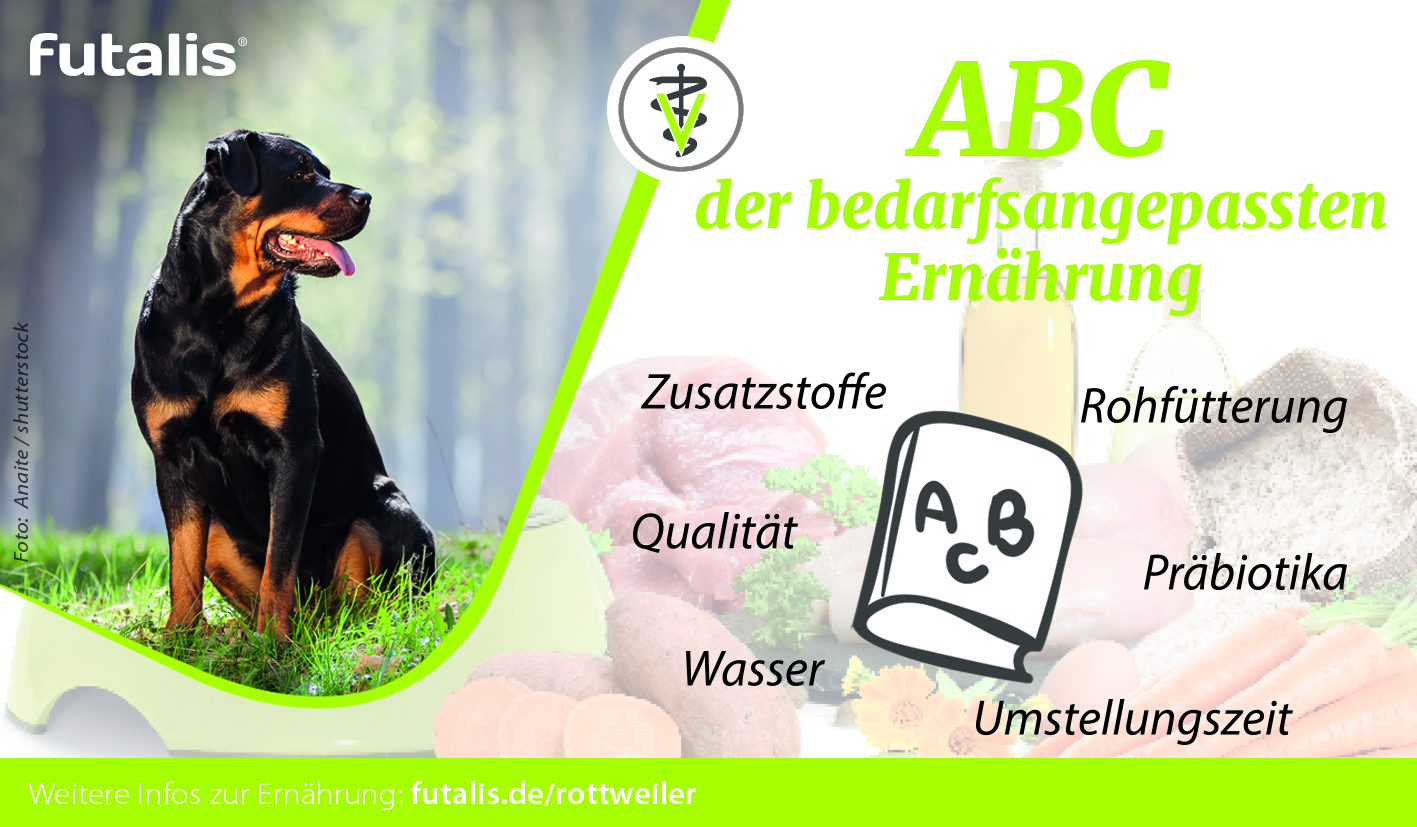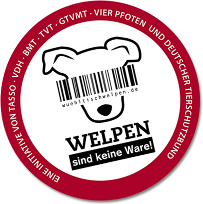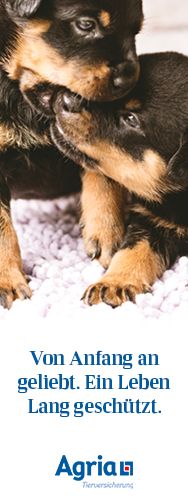| ADRK |
| Allgemeiner Deutscher Rottweiler-Klub e.V. |
Needs-based nutrition from A to Z
In the last issue you have already learned something about the most important terms of dog nutrition from A to M. Now you can also read interesting articles about nutrition from N to Z.
Kidney diet
The kidney diet is one of the most important dietary foods available for sick dogs. A reduced protein and phosphorus content and a high digestibility can relieve the weakened kidneys. An appropriate feeding can be supportive and therapeutic for many illnesses. Dietary feeds are also useful companions in cases of liver insufficiency, pancreatitis or urinary stones.
Omega-3 fatty acids
Omega-3 fatty acids belong to the group of polyunsaturated fatty acids. They are considered anti-inflammatory and are therefore frequently used for inflammatory diseases of the joints or the skin. Many omega-3 fatty acids are contained in linseed oil (a-linolenic acid) and fish oil (EPA and DHA). However, dogs also need other fatty acids to keep them healthy, such as linoleic acid (an omega-6 fatty acid), which is mainly found in vegetable oils, but also in animal fats.
Prebiotics
Prebiotics are for the dog itself indigestible food components, but they serve the desired intestinal bacteria (the intestinal flora) as food and thus support a healthy intestinal flora. These include, for example, inulin contained in the chicory root or pectins found in carrots, apples or sugar beet.
High quality
The quality of dog food depends on various aspects. On the one hand it is important that the dog food is hygienically flawless. For this reason, the ingredients used in the production process must be processed very fresh and then stored properly. On the other hand, ingredients should be processed that contain a high level of essential nutrients that the dog cannot produce itself. Proteins with an optimal amino acid composition are contained in meat or eggs, for example. High quality fats with many essential fatty acids are vegetable oils such as linseed oil.
Raw feeding
When talking about healthy dog nutrition, raw feeding is often cited as the healthiest form of feeding. However, the biological value of meat is hardly influenced by the heating process. Carbohydrate sources are even better tolerated when heated than when raw. It is therefore much more important to select the feed ingredients according to requirements. If you prefer to feed your dog fresh rather than ready food, you can cook your meals safely. Thus, the dog profits from further advantages, like a hygienically perfect food ration.
Trace elements
The trace elements were given their name because they only have to be added in small concentrations, i.e. "in traces". This applies to a number of elements, so that the group of trace elements is comparatively large and very heterogeneous. Among the most important trace elements are zinc, copper and iron. Several trace elements have toxic properties when oversupplied, so that the correct dosage must be observed.
Pregnancy and lactation
Pregnant bitches only need a special food in the second half of pregnancy to cover the increased energy and nutrient requirements for puppy growth. It is important to have an ideal energy supply that is high enough to cover your puppy's needs but does not lead to obesity. Overweight is a risk factor at the birth of the puppies. During the subsequent suckling period, the bitch needs a special lactation food. The energy and nutrient requirements depend on the number of puppies and change over time. In the beginning, when the puppies are still very small, the need increases gradually until the lactation in the 3rd to 4th week after birth. After that the puppies already start to feed themselves and the bitch's need decreases again due to the decreasing milk production.
Conversion time
When switching to a new feed with modified ingredients, the intestinal flora needs some time to get used to the new feed components. It is therefore normal for mild diarrhoea to occur temporarily. In order to alleviate the symptoms, the new food should always be mixed with the old food for several days. For some dogs a changeover time of a few days is sufficient, others need 2 weeks or longer, until the digestion levels up again. Therefore, it is most careful for each dog to refrain from frequent changes of food.
Vitamins
The word "vitamins" refers to a group of organic compounds that are needed for the various bodily functions. The common feature of vitamins is that they inevitably have to be ingested through food. Here, however, there are animal species differences. Vitamin C, for example, is essential for humans, but the dog can form it in the body itself. Important vitamins in dog nutrition are the fat-soluble vitamins A, D and E and the water-soluble B vitamins.
Water
Water is one of the most important nutrients for the body. It is responsible for dissolving the feed components in the digestive tract and for transporting the nutrients from the intestines via the bloodstream to the tissues. It also enables cell metabolism, the excretion of toxins through the kidneys and the maintenance of body temperature. The need for water is covered on the one hand by food and on the other hand by freely absorbed water. How much water a dog should drink depends among other things on the type of food. A dog needs a lot of water after eating dry food, in summer or after physical exertion. He will rather drink less if he has eaten moist food before or if he does not have to compensate for larger water losses by intensive panting. Even with diarrhoea, dogs need larger amounts of water to make up for the loss through the intestines.
Xylitol
Xylitol is a component sometimes found in human toothpaste. However, it is toxic to dogs, so the dog's teeth should always be brushed without toothpaste or only with special dog toothpaste. But other foods consumed by humans can also be dangerous for dogs. These include chocolate, avocados, onions, garlic, macadamia nuts and grapes.
Yucca
Yucca, aloe and other plants or herbs can have healing effects. However, care should be taken when using them in dog food. For most herbs and medicinal plants, it is not known exactly whether and in what dosage they are compatible for dogs. Overdosed, most medicinal plants develop a poisonous effect. In addition, medicinal herbs and medicines should only be used as needed and should not be permanently added to the food. In general, the administration should only take place after consultation with the veterinarian.
Additives
Additives are substances which are not themselves foodstuffs, but which are added to food in order to achieve certain effects. Only additives that have been tested and approved for use in dogs may be used in dog food. The use of artificial colours, flavourings or preservatives is often criticised. On the other hand, there are also nutritional additives that ensure a needs-based supply of vitamins and trace elements, where it is not possible with natural ingredients alone.
